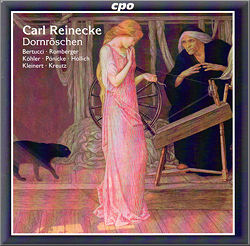|

Support
us financially by purchasing this disc from |
|
|
|
|
|
|
|
Carl REINECKE (1824-1910)
Dornröschen Op. 139 [52:13]
Sieben Kinderlieder (from Opp. 37, 63, 138, 196, 285) [11:09]
Dornröschen: Catalina Bertucci (soprano); Böse Fei, Spinnerin, Die Sage
von Dornröschen - Gerhild Romberger (alto); Königssohn – Markus Köhler
(baritone); Duet der Fliegen – Maria Pönicke (soprano) and Janina Hollich
(mezzo); Erzähler – Christian Klenihart (narrator)
Songs: Mieke Lelushko (soprano); Janina Hollisch (mezzo)
Feen-Ensemble/Anne Kohler; Peter Kreutz (piano)
rec. Konserhaus der Hochschule für Musik Detmold, 28 February-2 March
2011
German text and English translation included
CPO 999 870-2 [63:22]
Carl Reinecke lived a long life during which he was taught by Mendelssohn
and Schumann and in turn taught, amongst many others, Grieg, Bruch,
Sinding, Svendsen and Stanford. He was a fine pianist and inspired
a poem by H.C. Andersen. As a composer today he is mainly known for
a handful of works, including the Undine Sonata for flute
and piano whose popularity amongst flautists is helped by the shortage
of romantic works of comparable scale and merit.
The present enterprising issue draws attention to another aspect of
his output - secular cantatas for (largely) female voices and piano.
This was a popular genre in Germany, and indeed in Britain,
providing suitable material for private concerts at which young amateur
singers could perform for friends and relations. It would be unrealistic
to expect Wagnerian drama in these cantatas; rather, they usually
consist of a series of atmospheric but not too technically taxing
songs and ensembles all related to a single theme. In this case the
theme is the Sleeping Beauty story which is told by a narrator between
the sung items. The female singers act as a narrative chorus and as
a group of fairies whilst the soloists represent Sleeping Beauty,
the Wicked Fairy and a pair of flies(!). The last of these is particularly
charming and is an unexpected addition to the familiar story which
has the merit of allowing some quicker and lighter music than the
rest. Apart from the narrator the only male soloist is the Prince
who provides a welcome change of compass. The music is unfailing delightful
in the style of the composer’s early teachers, Mendelssohn and Schumann,
and if it breaks no new musical ground it is always charming, well
constructed, and varied.
The Children’s Songs are even simpler in manner, but have an easy
charm that just avoids being facile or sentimental. They are sensibly
varied here between soprano and mezzo-soprano soloists which avoids
any risk of monotony. All in all this is a disc which adds usefully
and very enjoyably to the composer’s representation and which points
to a repertoire which girls’ choirs might well explore in live concerts.
Too much sophistication in the performance of these works would be
out of place and the singers here all have fresh voices and a fresh
approach which closely matches the ideal for this kind of music. The
pianist Peter Kreutz appears to have been the guiding spirit behind
the revival of this music and its presentation here, and I salute
his enterprise and achievement in both respects.
John Sheppard
|











